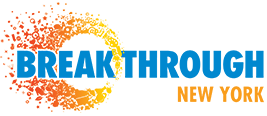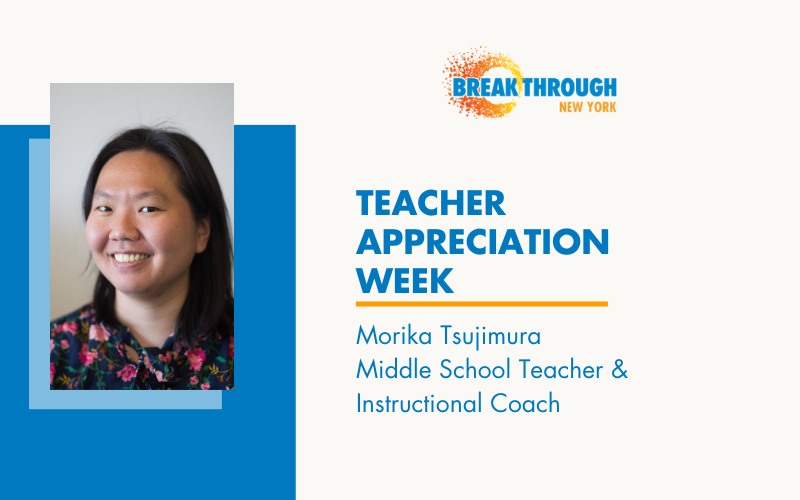This May, we’re showing our appreciation for middle school teacher and Instructional Coach Morika Tsujimura.
Morika Tsujimura has been a teacher for 16 years, and currently teaches science and math to middle school students. She grew up in New York City and earned her master’s in education from CUNY Hunter College. She will spend her summer for the fourth year as an Instructional Coach with Breakthrough New York.
How did you get involved with Breakthrough New York?
While I was an associate teacher, I became involved in the NAIS (National Association of Independent Schools) [which] does a yearly conference called SDLC (Student Diversity Leadership Conference). I joined the faculty of SDLC, and on that faculty there were many people who were involved in Breakthrough.
I started volunteering. The first thing I did was the admissions interviews with the 6th graders. That’s how I learned the most about the program very quickly. I got the Instructional Coach position, and in between I have continued to volunteer in different capacities.
What do you do as an Instructional Coach?
The pre-work is to get familiar with the curriculum and the training. What skills and goals there [are] for the summer. Before the program starts, I get to know the teaching fellows a little bit better and support them in their first experiences teaching. Orientation week is role-playing, pretending that you are the student and watching the lesson, and giving feedback.
During the program, it’s a lot of watching the teaching fellows, meeting with them, [and] talking about their goals. And being there for support and for advice. A lot of the questions I answer have nothing to do with the actual Breakthrough classroom; it has to do with career goals and pathways to some kind of career – how to put yourself out there. It’s kind of all-encompassing.
What is one highlight you’ve had from your time at Breakthrough?
I definitely love the celebration at the end of the summer program, when the middle school students get to show what they’ve worked on to their families. Seeing how emotional they are, saying goodbye to the teaching fellows – that’s a really special bond. It’s also the time when the teaching fellows get their awards. That’s really nice because I feel like a part of being an Instructional Coach is also advocating for your teaching fellows to become actual teachers, and so having that public forum where you’re celebrating all of those things is really special.
What do you enjoy most about your profession?
I really enjoy learning from my students and being challenged by them. I think about my purpose as a teacher, and how what I do in my day to day and my purpose are almost always aligned. I spend time with kids, and then they give back [with] those “a-ha!” moments that I get to witness. They tell me some joke that’s very funny or not funny. I get to see them doing new things and doing really good work.
It is highly intellectual work and enjoyable. There’s tons of fun and challenge in teaching. I think people do have respect for teachers, but maybe overlook the intellectual challenge of it. I definitely want that to come across.
There’s never a time that I’ve questioned becoming a teacher. When I hear about all these people leaving the profession for good, that really breaks my heart, because I know I could be doing other things, but I wouldn’t – I can’t imagine not spending my time with [students].
What do you wish more people understood about being a teacher?
What I want people to understand is just like with anything else, the more we do it, and in thoughtful and disciplined ways, the better we get at it. We do become experts. Experience informs the decisions we have to make every day. You can see in all the bills that are being passed across the country that teachers’ expertise is devalued all the time. There’s a debate, but you wouldn’t do this with any other profession. That is something that I want people to understand. Our teachers are good at what they do because they practice.
You can get better at it just like anything. There’s research out there that we can read, and we can change how we teach based on that. We read books, we talk to each other, we do professional development. We try out new lessons, we do peer feedback. All these things are in place so that we do become better teachers over time.
Do you have any advice for people who are thinking of becoming a teacher?
One of the things I say, which I learned from a colleague, is that whenever you’re new, you’re new for the whole year. Maybe your day to day looks better because you have [a] routine, but in terms of the things that happen that are tied to school culture and special events and communication – unless you’ve done a full cycle, you’ve never seen it before. Keep that in mind and allow yourself grace.
Part of that also is to make sure that you’re asking questions. I think we’re in a culture that wants to pretend that we know we know everything, or that we don’t make mistakes. And in fact, that’s actually counterintuitive to teaching, because it’s all about learning from mistakes and identifying the things that you don’t know, and so really lean into that. Showing that you’re a lifelong learner is actually what we want. That’s my advice.


